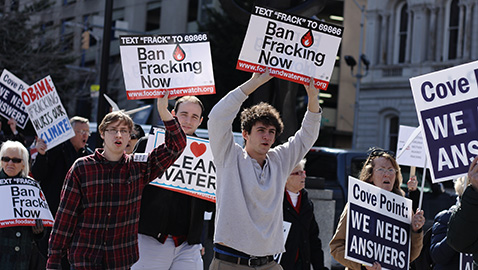WASHINGTON – An environmental group will deliver more than 35,000 citizen letters by hand to the Maryland Public Service Commission Wednesday in opposition to the proposed Cove Point liquefied natural gas export facility in Calvert County.
The Chesapeake Climate Action Network, a nonprofit that has been at the forefront of the opposition to the facility, will bring the public comments to the commission’s Baltimore office in boxes. Wednesday is the deadline for submitting public comments, and the PSC does not accept them electronically.
Meanwhile, the Federal Energy Regulatory Commission, which is providing the most sweeping oversight of the case, denied on Monday the requests of Maryland Senators Ben Cardin and Barbara Mikulski to hold additional public hearings on the commission’s coming assessment of the proposal.
The state’s Public Service Commission is responsible for granting the permit needed for the 130-megawatt power plant Dominion will need to construct. It is conducting the most comprehensive review of the project of any state-level agency.
On Wednesday, CCAN is “outlining our closing case to the Maryland Public Service Commission,” said Kelly Trout, the group’s communications director.
In addition, 50 Maryland businesses signed a letter to the PSC Tuesday stating their opposition to the plan. Signees included Blue Moon Rising, an eco-tourism village near Deep Creek Lake, Financial West Group in Westminster and the Chesapeake Sustainable Business Council.
The Dominion Resources LNG facility, which currently only imports natural gas, has been at the center of a months-long controversy over its plan to export LNG, something a handful of facilities across the country is moving toward amidst protest and praise from different corners.
After meeting with community groups in February, Cardin and Mikulski wrote to FERC requesting that the commission hold five public meetings in regions across the state, in addition to one it had already agreed to in Calvert County.
Via letters released Monday, FERC acting chairman Cheryl LaFleur told the senators that the one extra meeting for public comment on the commission’s assessment is appropriate since it will take place in the county where Cove Point is located.
The environmental assessment FERC is crafting has been questioned by many citizens who have asked for a more rigorous report. Dominion has said the commission’s oversight is thorough.
Any interested stakeholder can submit a written comment to the commission, LaFleur said. FERC gives equal consideration to written comments and comments at a public meeting, she said.
Once the assessment is released, it will be open for comment on the Federal Register and the single Calvert County hearing will be held.
“I can assure you that the Commission’s decision on whether to authorize the project will be based on a careful review of the issues and will be rooted in the law, facts, and science,” LaFleur wrote to the senators.
FERC has said it will release its environmental assessment of the project May 15.
After Russia took control of Crimea late last month, politicians like Sen. Mary Landrieu, D-La., began pushing for the acceleration of U.S. natural gas exports, hoping to put pressure on Russia, which supplies much of Europe’s gas. Louisiana will be home to the first LNG exporter, Sabine Pass LNG Terminal, which is slated to begin exporting in 2015.
Last week, hearings were held on the matter in the House and the Senate. A House bill was introduced to expedite U.S. LNG exports by granting all pending applications.
Some say simply the decisive entry of the U.S. into the global market could help affect the market and send a message to Russia, even if the U.S. can’t begin exports immediately.
However, it is a lengthy path to exporting. In addition to approval from the Energy Department, companies like Dominion must secure local, state and federal permits, as well as financing.
Environmentalists contend that LNG exporting will increase net global greenhouse gas emissions and provide incentive for hydraulic fracturing, the practice of fracturing shale rocks to release gas.

